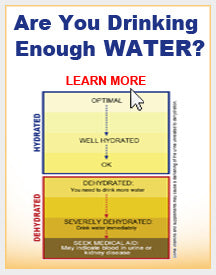"I'm dying of thirst!"
Well, you just might. It sounds so simple. H20 - two parts hydrogen and one part oxygen. This substance also known as water, is one of the most essential elements to health and is so important that your body actually has a specific drought management system in place to prevent dehydration and ensure your survival. Water might be everywhere, but one must never take it for granted.

Water makes up more than two-thirds of human body weight, and without water, we would die in a few days. The human brain is made up of 95% water, blood is 82% and lungs 90%. A mere 2% drop in our body's water supply can trigger signs of dehydration: fuzzy short-term memory, trouble with basic math, and difficulty focusing on smaller print, such as a computer screen. (Are you having trouble reading this? Drink up!) Mild dehydration is also one of the most common causes of daytime fatigue. An estimated seventy-five percent of Americans have mild, chronic dehydration. Pretty scary statistic for a developed country where water is readily available through the tap or bottled water.
Water is important to the mechanics of the human body. The body cannot work without it, just as a car cannot run without gas and oil. In fact, all the cell and organ functions that make up our entire anatomy and physiology depend on water for their functioning.

-
Water serves as a lubricant
Water serves as a lubricant in digestion and almost all other body processes. The water in our saliva helps facilitate chewing and swallowing, ensuring that food will slide easily down the esophagus. Water also lubricates our joints and cartilages and allows them to (pardon the pun) move more fluidly. When dehydrated, the body rations water away from the joints. Less lubrication equals greater friction and that can cause joint, knee and back pain potentially leading to injuries and arthritis. Even our eyeballs need plenty of lubrication to work well and remain healthy.
-
Water regulates body temperature
Our bodies can control over-heating through perspiration from sweat glands in the skin and from evaporation which produces a cooling effect. Blood is also routed into areas close to the surface of the skin where it can be cooled and then carried back to the interior of the body. Conversing in a cold environment, the skin maintains proper body temperature by shunting the blood away from the exterior surface thereby conserving heat within the body. The movement of water within our cellular systems also transports vital blood plasma which is 92% made of water. Blood plasma play a critical role in buffering the body’s pH, circulating antibodies from the immune system, and regulating osmotic balance which all helps to maintain proper body temperature.
-
Water forms the base for saliva
-
Water forms the fluids that surround the joints
- Water regulates the body temperature, as the cooling & heating is distributed through perspiration
- Water helps to alleviate constipation by moving food through the intestinal tract and thereby eliminating waste - the best detox agent.
- Water helps to regulate metabolism
In addition to the daily maintenance of our bodies, water also plays a key role in the prevention of disease. Drinking eight glasses of water daily can decrease the risk of colon cancer by 45%, bladder cancer by 50% and it can potentially even reduce the risk of breast cancer. And those are just a few examples! As you follow other links on our website, you can read more in-depth about how water can aid in the prevention and cure of many types of diseases, ailments, and disorders that affect the many systems of our bodies.
Since water is such an important component to our physiology, it would make sense that the quality of the water should be just as important as the quantity. Drinking water should always be clean and free of contaminants to ensure proper health and wellness.
Read Next: Are You Drinking Enough Water?



